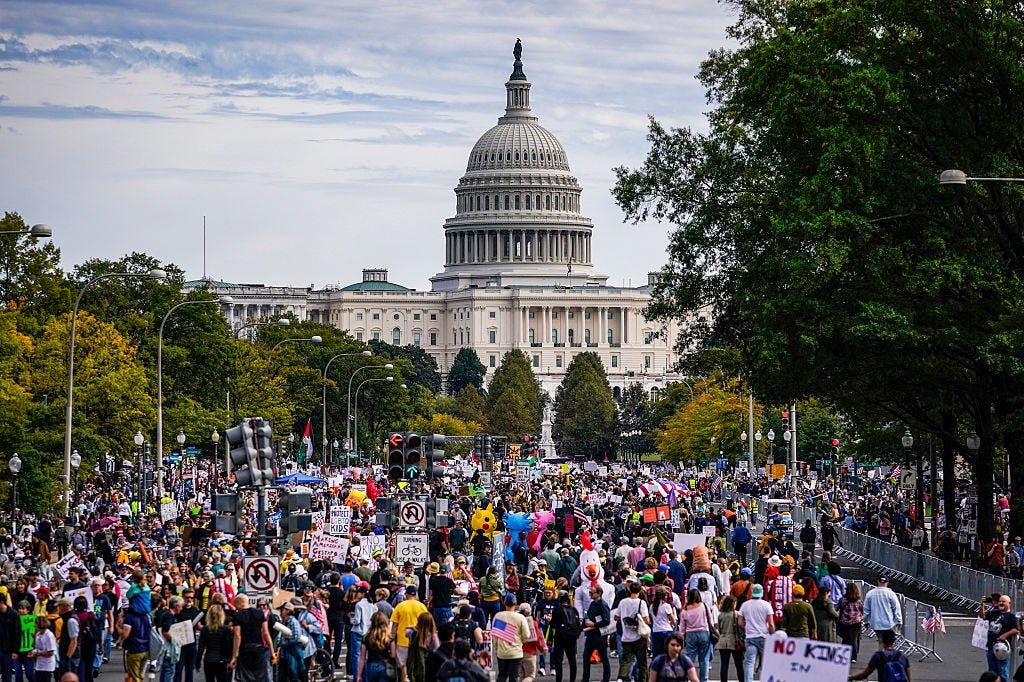
This article is brought to you by American Purpose, the magazine and community founded by Francis Fukuyama in 2020, which is proudly part of the Persuasion family.
A politics of resistance is taking shape in the United States. Democratic candidates were victorious across local and state elections last week, and Californians voted to change their redistricting procedures to counter partisan gerrymandering in other states. These results show that political opposition exists, and that it can win elections. But in order to sustain the momentum from these elections, a pro-democracy coalition needs to mobilize now to make itself visible, coherent, and cross-partisan in the coming months and years.
While it may seem like the resistance has been slow to take shape, there are many promising signs across the political establishment and civil society. Up to seven million Americans participated in No Kings protests across the country in June and October. Media outlets collectively refused to sign a Pentagon pact that conditioned press access on government approval; universities also rejected a preferential funding compact with the Trump administration. Republicans have spoken out about National Guard deployments across state lines, attacks on Venezuelan ships, and the FCC’s censorship of Jimmy Kimmel. These signals of dissent may provide a sense of hope that a political opposition can mobilize to win the 2026 elections.
The democratic erosion we see in the United States has taken place in many other democracies—and with a remarkably clear trajectory. While there is no clear or obvious way to defeat an illiberal leader, recent international examples show the urgent need for a pro-democracy coalition, defined as a coalition of cross-partisan political actors collaborating with cross-sectoral civil society groups using messages of shared democratic values.
Normalize Political Talk as Non-Partisan
The first step in building a pro-democracy resistance is thinking beyond traditional divides. The Trump administration is not enacting a partisan policy agenda—if anything, it has broken with longstanding Republican policies and values—and the political response also needs to go beyond a partisan playbook. This administration is willing to defy court rulings, disappear residents, threaten opponents, and more. Everyone, from large multinational corporations to recent immigrants, has to go about their daily business in a completely different way. This is new for Americans, and requires us to rethink how we engage politically.
One basic requirement of building the pro-democracy coalition is normalizing political talk as non-partisan. Many of us avoid it with neighbors or colleagues for fear of awkwardness. But silence cedes the terms of public life to those willing to weaponize it. It’s not “partisan” to insist that leaders respect due process and court orders, that public servants be chosen for competence rather than loyalty, that officials don’t profit from office, and that leaders do not attack and punish political speech. By not talking about politics, we let the president monopolize it. Soon, he will degrade all pluralistic civic space. Talking plainly about what’s abnormal is the first step to finding allies and building a shared project.
Prioritize Democracy and Drop Litmus Tests
In Democracy in America, Alexis de Tocqueville noted that “Americans of all ages, all conditions, all minds constantly unite.” People come together to support specific causes; they also come together to solve local problems. While the wide range of issues and causes makes for a vibrant, heterogeneous civic space, it can paradoxically make it more difficult to forge ties across issue areas.
Many issue pillars—education, health care, climate justice, election integrity—are well-developed, but siloed. Polarization of our national politics has also trickled into civic space, with advocacy groups often using litmus tests to determine which elected officials are effective advocates.
However, the rules of democratic competition and fair play are being rewritten. If we do not secure democracy today, we will not be able to fight for our preferred issues tomorrow. Therefore, one big —albeit unappealing— part of building a pro-democracy coalition is abandoning any purity tests for the candidates you’ll support and the political causes you’ll ally with. Defeating an illiberal leader requires anyone who considers themselves pro-democracy to come together on the minimum collective grounds they can articulate. If you disagree on everything but agree on just the one question of whether or not President Trump is overstepping his bounds, that is enough for a resistance campaign to work. Engaging in this way does not mean sacrificing your principles or your goals.
In practice, this coalition-building requires coordination across partisan and civil society groups in order to develop a shared message that all aligned candidates and leaders can use to demonstrate their short-term goal of protecting democracy. It requires civil society to mobilize through all available means—grassroots, influencers, digital campaigns, issue networks—to rally support for the pro-democracy, cross-party coalition. It also helps to reward courage across the aisle. When officials of any party defend election integrity, democratic values, or the rule of law, applaud them publicly. Coalitions grow when people know they won’t be ostracized for doing the right thing.
One example is France’s “Republican Front,” a cross-party alliance that has mobilized consistently to prevent the far-right National Rally from winning legislative majorities or the French presidency. In France’s 2024 National Assembly elections, the far right seemed to be positioned for huge electoral wins: After the first round of voting, the National Rally was the leading party. However, 501 of 577 seats went to a second round of voting—and most of these races included more than three candidates.
French political parties quickly organized and agreed to strategically support each other’s candidates. Parties formed blocs, with the Ensemble bloc consisting of center and center-right parties (including that of President Emmanuel Macron) and the New Popular Front consisting of left parties (ranging from Communists to Greens). Although there were enormous ideological and policy disagreements among these parties, they agreed to have their candidates step down to narrow most second-round races to two candidates—and then rallied their voters to “hold their noses” and support the non-far-right candidates. At least 132 NFP candidates and 80 centrist candidates stood down, and, according to polls, over 50% of Macron supporters and 29% of center-right supporters voted for the far-left NFP candidates.
Civil society actors had only weeks to adapt to the second-round election strategies. They focused on simple messages, such as “we are better united than alone,” and formed groups on WhatsApp to disseminate polling results, focused slogans, and strategies for reaching undecideds. Most importantly, they eschewed a top-down approach in favor of decentralization and adaptation. They came together not because of policy agreement but because of a “need to preserve democracy today, in order to allow for policy conflict tomorrow”—a message that can reach voters when trusted organizations and leaders work together.
Similarly, parties have built cross-ideological coalitions to protect democracy in Brazil and in Poland. In 2022, Lula da Silva challenged the reelection of Jair Bolsonaro, the far-right president. Parties that have historically opposed Lula’s Workers’ Party backed him, and Lula promised to govern in a coalition. He chose a former center-right rival as his vice president, and appointed ministers to his cabinet who had worked in Bolsonaro’s government. Critically, Bolsonaro allies (such as Arthur Lira, the president of Chamber of Deputies) were quick to accept the election results. In Poland, a coalition of parties formed in 2018 to challenge the Law and Justice (PiS) party. The coalition mobilized for years, first contesting local and mayoral elections. In 2023, party blocs (like those in France)—the Civic Coalition, the Third Way, and the Left—managed to coordinate their pro-democracy message and win a legislative majority.
In both countries, civil society provided critical messaging, campaigning, and grassroots support to the coalition parties. In Brazil, organizations like PACTO coordinated some 200 organizations across ideological lines to counter disinformation about election integrity. Their efforts were not directed towards specific candidates—instead, they concentrated on building large umbrella organizations and focusing on the minimum grounds on which people across sectors could work together to support democracy. In Poland, massive public demonstrations in advance of the elections, plus digital activism emphasizing unity and the principles of Poland’s hard-won liberal democracy, buoyed the pro-democracy parties in the polls.
In all three of these cases, governing across ideological lines has been a challenge. But the immediate threat of democratic erosion was temporarily halted, and parties were able to show that democratic commitments prevailed over ideological purity tests. These efforts show that pro-democracy mobilization takes time and focus, meaning the sooner a collective effort can be mobilized, the better.
Building Factions in a Two-Party System
However, the above examples are all multi-party systems. In a two-party system, cross-partisan coalitions are very difficult—after all, they only have one opposition party. We must therefore abandon the big labels of the two parties and instead embrace factions.
For Americans, resistance might require working with people whose views you disdain, and whom you’ve historically worked against. Democracy is a system that allows us to live in harmony and respect with people of vastly different backgrounds and opinions. In this moment, setting aside policy disagreements is vital to protecting it. The new politics of democratic erosion require a new politics of coordination. Those who care about democracy must proceed based on what unites us (even if it is just one or two things: rule of law good; corruption bad; everyone equal under the law).
We cannot expect the Democrats to do the entire work of opposing Trump and also laying out a compelling policy agenda for the 2026 midterms and the 2028 presidential elections. We should let factions flourish instead of denouncing them as a sign of a party at war with itself or unable to coordinate. The Republican Party was recently composed of honorable, rule-of-law abiding politicians, who have had to cede the label of their century-old party to the MAGA extreme. But these Republicans deserve to exist politically—perhaps as the Rule of Law Conservatives, or the Party of Principle.
Similarly, we can identify factions like the Heartland Democrats or Social Progressives within the Democratic Party. All of these factions can run their own candidates and build their own policy agendas—and most importantly, they can signal their solidarity with the project of democracy and their willingness to work together to stop Trump’s actions. Historically, factions are how parties adapt and renew. They also work together within parties as coalitions. By making factions more identifiable and public, elected officials can show the same unity that politicians have in other countries—and can broadcast the simple message of preserving democracy. This maneuver will show that a pro-democracy coalition does indeed exist in the United States. Similarly, civil society groups that already work to advance a diversity of causes can then show that, while they remain steadfast in their issue commitments, they are willing to strategically support democratic values when urgently demanded.
Pro-democracy coalitions don’t require us to pretend our differences don’t matter; they do. Coalitions are a truce, not a merger. But if we fail to protect the rules that let us contest power peacefully, we will lose the very arena where policy fights can be won.
France, Brazil, and Poland are reminders that resistance isn’t only about mass protests or heroic individuals. It’s about ordinary people choosing to work together on the narrowest possible common ground. If others can do it, so can we. The only question is whether we’ll start building that pro-democracy coalition now—or wish we had, later.
Didi Kuo is a Center Fellow at the Freeman-Spogli Institute for International Studies at Stanford University. She is the author of The Great Retreat: How Political Parties Should Behave and Why They Don’t.
Follow Persuasion on Twitter, LinkedIn, and YouTube to keep up with our latest articles, podcasts, and events, as well as updates from excellent writers across our network.
And, to receive pieces like this in your inbox and support our work, subscribe below:






Yes 100%. Count me in!
I would add that the pro-democracy coalition is already in the making on Substack, but there’s a problem. It’s members:
1) Don’t widely recognize each other as pro-democracy aligned writers.
2) Have not coalesced on the platform. The ideological landscape and discussion forum is paywalled, fragmented and in flux.
3) Don’t cite one another as well as they should. At their best, citations are the scaffolding of ideas — the bridges between writers. Hyperlinks are fine too.